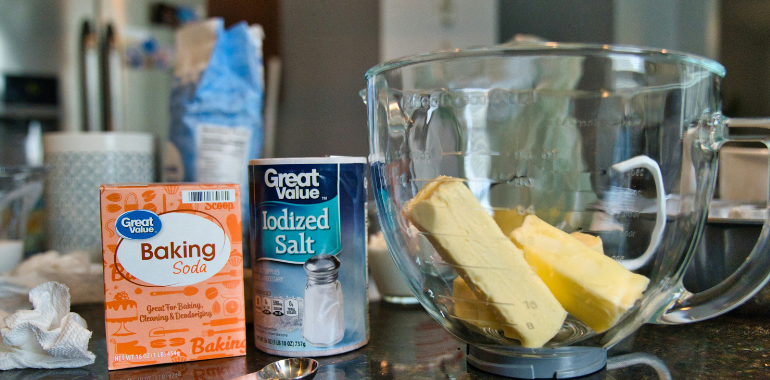Table Of Contents
Baking Soda and Weight Loss – Is There a Connection?
We all know baking soda as a humble kitchen staple, often spotted in cookie recipes or as a handy cleaning agent. But could this unassuming powder secretly be a weight loss ally?
Can you swallow baking soda? We’ll sort through truths and fiction in this fascinating piece as we investigate the reported connection between baking soda and managing weight. We’ll explore the research underlying its possible physiological benefits and how it might be the unanticipated component in your quest for improved health.
So, this article promises to add a dash of knowledge to your day!
The Untold Truth: Drinking Baking Soda Dangers You Should Be Aware Of
Baking soda! Also known as sodium bicarbonate, this versatile white powder is a superhero in the culinary world, a trusty sidekick for cleaning tasks, and even a secret weapon against odors. But wait, there’s more! In traditional medicine, including home remedies, baking soda has been hailed for its antacid prowess, taming the fiery beast of stomach acid and offering relief from heartburn, indigestion, and ulcer pain.

Severe side effects:
- ALKALOSIS
The most notorious of these villains is alkalosis, a condition where the body is flooded with bicarbonate ions, causing the body’s pH level to skyrocket. The symptoms? They’re not pretty: muscle twitching, hand tremors, nausea, vomiting, and, in severe cases, even coma.
- HYPERNATREMIA
Another potential hazard lurking in the shadows is hypernatremia, a fancy term for high sodium levels. This can trigger hypertension or swelling due to fluid buildup. If you’re battling kidney disease, heart problems, or high blood pressure, it’s best to give baking soda a wide berth without medical supervision.
- STOMACH TO RUPTURE
Is it safe to drink baking soda? And there’s more! Downing baking soda, particularly after a feast or with alcohol, can cause your stomach to rupture. How? The chemical reaction between baking soda and stomach acid generates gas, leading to bloating (but this is a rare side effect.).
- THROW OFF YOUR BODY’S NATURAL ACID-BASE BALANCE
Overdosing on baking soda can throw off your body’s natural acid-base balance, meddling with the functioning of your muscles, heart, and brain. It can also drain your body’s potassium levels, leaving you weak, tired, and plagued with muscle cramps.
- INTERFERING WITH CERTAIN MEDICATIONS
Asprin, corticosteroids, and memantine, a drug used in the treatment of Alzheimer’s disease interact with baking soda. The pantry staple can also interfere with the absorption and effectiveness of certain drugs like the antibiotic ampicillin, HIV medication, and antifungals which need stomach acid to work.
Also, read – 15 Best Nutrition Apps of Today
Baking Soda Cleanse: A Revolutionary Approach to Shedding Pounds?
5 Benefits of Baking Soda in Water
It’s been said that adding baking soda to water is a health tip. Although it doesn’t help you lose weight directly, it has several advantages that may help you in the long run. The top five benefits of drinking baking soda are as follows:
1. Soothes Indigestion
Baking soda can help soothe stomach acid, reducing heartburn and indigestion. It acts as an antacid, neutralizing the excess stomach acid that causes discomfort.
2. Boosts Kidney Health
Research shows that baking soda solution could help slow the progress of chronic kidney disease by neutralizing the acid in your blood.
3. Enhances Exercise Performance
During intense training, your muscles produce lactic acid, causing fatigue. Baking soda’s alkalinity may delay fatigue, allowing you to exercise at your peak for longer.
4. Improves Oral Health
Baking soda is a popular component in toothpaste and mouthwash. It can kill bacteria, reduce plaque, and prevent tooth decay.
5. Promotes Skin Health
When added to bath water, baking soda can soothe itchy skin and relieve irritations and infections. It’s also used as a natural exfoliant that can leave your skin feeling soft and smooth.
Lemon and Baking Soda: A Powerful Duo for Weight Loss?
Lemons are low in calories and high in vitamin C and fiber. They also contain polyphenols, which have been shown to suppress body weight gain and fat accumulation. Drinking lemon water, especially instead of higher-calorie beverages, could contribute to weight loss.
As mentioned earlier, baking soda doesn’t directly aid in weight loss, but it can potentially improve digestion and workout performance, indirectly aiding in weight loss.
Some dieters suggest that lemon and baking soda create an alkaline environment in the body, which is believed to raise metabolism and promote weight loss. However, this claim lacks solid scientific evidence.
While there’s no harm in drinking lemon water with baking soda (provided you don’t exceed the recommended daily sodium intake), it shouldn’t be seen as a standalone weight loss solution.
The Potential of Baking Soda and Lime for Weight Management
Honestly, this topic is intriguing. While some anecdotal reports suggest potential benefits, it’s important to mention that the scientific evidence directly supporting these claims is still emerging.
Regardless, lime is rich in vitamin C and antioxidants associated with metabolic-boosting properties. The citric acid in lime may help improve digestion, which could indirectly aid weight management by improving nutrient absorption and reducing bloating.
When is the Best Time to Drink Baking Soda for Weight Loss?
The standard dose recommended is 1/2 teaspoon dissolved in a glass of water, consumed on an empty stomach, once in the morning or once before bedtime.
KEEP IN MIND:
Serious health problems can result from consuming excessive amounts of sodium.
For most adults, the American Heart Association suggests consuming no more than 2,300 mg daily, with an optimal limitation of no more than 1,500 mg daily. Most of your sodium comes from your diet and drinking baking soda increases the amount you consume.
Each teaspoon of baking soda contains around 1,000 mg of sodium, so just one serving can exceed your daily allowance!
Does Baking Soda Help You Lose Weight?
One theory suggests that baking soda can promote feelings of fullness, thereby helping to control appetite and reduce caloric intake.
There are also suggestions that baking soda, when combined with water, apple cider vinegar (ACV), or lemon juice, could potentially assist in weight loss.
The combination of acv and baking soda, in particular, is said to improve blood sugar levels and promote feelings of fullness, which could theoretically contribute to weight loss. However, more research is needed to confirm these effects.
Despite these theories, little to no scientific evidence indicates that baking soda can help you lose body fat.
Also, read – What Can You Eat While & After Fasting?
Baking Soda Weight Loss Recipe – Your Simple Solution
Ingredients
- 1 glass of water (about 250ml)
- 1/2 teaspoon of baking soda
- Freshly squeezed juice from 1/2 lemon
Instruction
Pour the water into a glass. Add the baking soda and stir until it’s completely dissolved. Press the juice from half a lemon into the glass. Stir the mixture well.
Can You Ingest Baking Soda Safely for Weight Loss?
1. DOSAGES
There is no established dosage for baking soda for weight loss, as it’s not a recognized use for this substance. Some people start with half a teaspoon mixed in a large glass of water and gradually increase to 1-2 teaspoons.
2. CONSUMPTION METHODS
Baking soda is typically dissolved in water and drunk on an empty stomach. It has a rather unpleasant taste, which you might want to mask with a bit of lemon juice.
However, baking soda and vinegar drinks are not a good idea, as this will neutralize the effect.
3. WATCH BODY’S REACTION
If you start to experience any discomfort, such as bloating, gas, nausea, or increased blood pressure, stop taking baking soda immediately.
4. SAFETY PRECAUTIONS
If you’re on a sodium-restricted diet, have kidney problems, or suffer from chronic health conditions, you should avoid consuming baking soda without first consulting your doctor.
Pregnant or breastfeeding women also need to avoid ingesting baking soda for weight loss.

Baking Soda in Coffee for Weight Loss: An Unexpected Twist on Your Morning Routine
There is absolutely no direct scientific evidence to support the idea that putting baking soda into the coffee lowers one’s weight. Coffee is believed to boost metabolism due to its caffeine content, whereas for others, adding baking soda is reported to aid in the neutralization of coffee’s acidity, hence making it a kinder and easier drink to the stomach.
Yet, it’s mostly anecdotal, and further investigations are necessary to corroborate the claims.
Also, read – 7 Reasons You Need to Drink Apple Cider Vinegar Every Night Before Bed
To Sum Up: What Happens if You Drink Baking Soda Regularly?
It’s clear that this humble kitchen ingredient, often relegated to the back of the pantry, has more to offer than just leavening your favorite baked goods.
Baking soda in moderate doses can be a surprising ally for your health, a kind of detox, helping with issues like heartburn, and oral health and enhancing athletic performance. Yet, like a double-edged sword, it can also bring about unwanted side effects if consumed excessively or improperly, from gastrointestinal distress to high blood pressure.
So, before you raise that baking-soda-infused glass to your lips, remember—moderation is your best companion on this bubbly journey to wellness.
Wendy is a Registered Dietitian with a passion for writing about nutrition, health, and medicine. Her aim is to translate the medical jargon to make information accessible to everyone so that they can make informed decisions about their health.
Education:
BSc. Dietetics (UKZN) (1994 - 1998)
Post-Graduate Diploma: Dietetics (UKZN) (1999)









